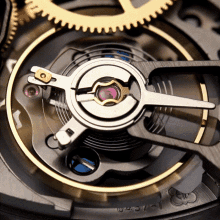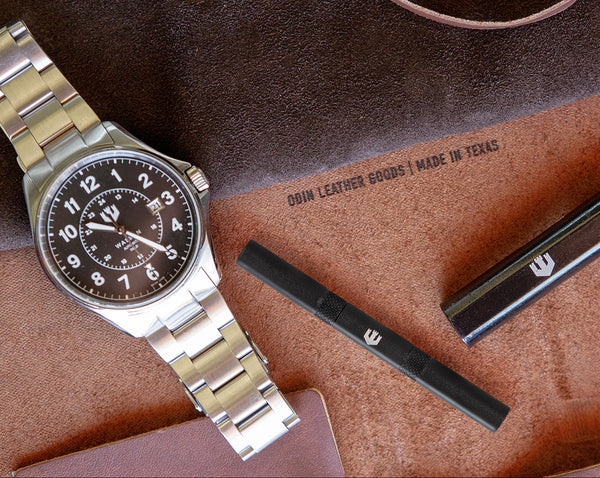
Automatic Watches: Pros and Cons
It's really common to hear companies talk about all the good things about their products. After all, they're trying to make sales, right?
But how often do you hear companies talking about the negative aspects of their products?
I can say "not very much" in my experience. And frankly, there's good reason for that. That would seem counterproductive when the goal is selling more.
But I don't think it's counterproductive, at least not in our case. Because our goal isn't just to sell to the most people. It's to sell to the right people. If you buy my watch, and don't like it, there's a good chance that there was some miscommunication or misunderstanding. It may be that what you want in a watch doesn't look like the watches we sell. I'd rather you know that before you purchase a watch than after. That being said, we have yet to have a customer say they don't like our watches. In fact, quite the opposite is true.
Nevertheless, one of our core values at Wasson Watch Co. is authenticity. We want to be clear, open, and honest, and give you the best possible opportunity of getting a handle on what you're getting into when you buy an automatic watch (including a Wasson Watch).
Automatic Watches: A Brief Introduction
Before I jump into the pros and cons of automatic watches, let me explain what they are. Specifically, I am referring to automatic, mechanical watches (as opposed to automatic solar watches, for instance). An automatic, mechanical watch has an internal mechanism called a movement, which is wound by the movement of the wearer. There is a weighted rotor, which moves quite easily every time you move, thus winding the mainspring, and ultimately providing power for the watch.

With no further adieu, let's jump into the pros and cons of these exquisite mechanisms:
Pros:
1. Reliability: Unlike your typical quartz watch, automatic watches don't require batteries. They are powered by the movement of your wrist, and if you haven't been moving (or wearing the watch), you can always manually wind it. As someone who has had a battery-powered quartz watch fail on me in the middle of doing something important, I can say that reliability is very important. 
But I'm not the only one who thinks so. Years ago I came across an article in which I learned that Green Berets, Navy SEAL's and other elite special operators often wear automatic watches on deployments and in combat operations.
2. Exquisite Craftsmanship: The world has gained a lot since the Middle Ages - electricity, indoor plumbing, air conditioning and central heating, refrigeration, automobiles, aircraft, and tons more. But we've lost things too. Consider architecture, for instance. Beautiful cathedrals were built all across Europe for centuries. But many modern churches can be found in strip malls, or frankly they're often built to look kind of like strip malls.
The mechanisms on automatic, mechanical watches are beautiful. They are a thing to behold, and the movements on our watches are no exception. That's why each of our watches comes with a sapphire crystal on the back, through which you can see your hand-crafted, Swiss movement.

3. Durability: Now bear with me for this one. This isn't exclusive to automatic watches. However, given the greater expense of producing automatic watches, they tend to be engineered to last. For instance, the Wasson Automatic Field Watch case and bracelet is made with 316l stainless steel, which is both maritime grade and anti-corrosive. The glass (known as a crystal in the watch world) is made out of sapphire, the second hardest type of glass after diamond. That means it is virtually impervious to scratches (just watch out for your wife's engagement ring).
While quartz watches can have these same features, they tend to be more common in automatic watches.
4. Holds Value Long Term: Automatic mechanical watches have a lot that go into them, and many of them are built to last. They tend to hold their value better than many consumer goods, and in some cases their value actually increases significantly over the years. So in five or ten years if you don't like them anymore, you don't have to just throw them out. You can turn around and sell them, and put your earnings towards something else.
Or wear it until you're old, and pass it down to one of your children. There are few heirlooms so special and meaningful as a quality timepiece that was worn for years by a father or grandfather (or both)!
Cons:
1. Price: It's true. You can purchase a cheap, quartz watch for as low as $30. Some go for as much as $200 or $300, but that's still a lot less than most automatics, which typically start in the $500's for "introductory" models, and commonly cost thousands of tens-of-thousands of dollars. A few, very-high-end automatic watches sell for hundreds-of-thousands or millions of dollars.
For many this is part of the draw. Watches are a way to show status, accomplishment, or success, and given the wide variety of watches on the market, you can express yourself to boot. That makes tool watches (field watches, dive watches, pilot watches, etc.) very desirable for folks who might want something that signals success without being too flashy. Nevertheless, price is a major barrier to entry for many.
2. Winding: Automatic watches are wound by the movement of your wrist, but if you don't wear them for a couple of days, guess what happens? They stop. So, next time you put your watch back on you have to re-set the date and time. It's a miner inconvenience to be sure, but it's inconvenient nevertheless. Fr some folks (like myself) who wear the same watch every day, this is virtually never a problem. However, if you don't always wear a watch, or you have multiple favorites, setting your automatic watches every time you decide to wear them could get annoying over time. Some folks in that situation opt to purchase an automatic watch winder, which keeps their watch wound when it's not being worn, by moving it slowly over time. Others just take the time to set their watches.
3. Accuracy: Believer it or not, automatic mechanical watches are typically not as accurate as quartz watches. While quartz watches may lose just a few seconds per month, most automatic watches gain or lose at least a few seconds per day. Even greater accuracy can be found with your cell phone, smart watches, and some quartz watches that sync each night with the Atomic Clock through radio transmissions.
And that's just baseline performance. If you don't wear your watch very much, or if you aren't moving around enough when you wear it, that can cause the time to be off by even more.
When it comes right down to it, most folks who wear automatic watches recognize that there are more accurate options out there, and they are ok with the trade-offs.
4. Maintenance: This might fit under another category, but I believe it deserves its own call-out. It's true that you can wear a good automatic watch for decades, and pass it down to future generations, who may also wear it for decades. But that doesn't mean it will be maintenance free. Automatic movements can have dozens or even hundreds of moving parts. These parts may be moving nearly continuously for years on end, which puts wear and tear on each individual part and the overall mechanism.
Most automatic watches should probably be serviced at least once every 10 years for cleaning, oiling, tightening, and replacement of parts that are overly worn or damaged.
In addition to having to send your beloved timepiece in for a few weeks (or a few months in some cases) it can also be costly. Many people are surprised when a watch for which they paid $10,000 requires a $1,000 service. They feel like they already paid everything that ought to have been paid up front, but the truth is those that there is a cost to ownership.
Frankly, any kind of service can be costly and slow with many automatic watches. Having experienced this firsthand, I can say it's frustrating at best.
That's one of the reasons why I've personally made customer service a high priority for Wasson Watch Co. Our goal for every service, no matter what kind is:
1) Quality - We want to get the job done well, whether it's a cleaning, repair, or replacement.
2) Transparency - We want to keep you in the loop for the entire process, and will communicate with you quickly and openly about where we are in the process.
3) Speed - While some more complex services can take weeks, or in rare cases months, most of our services take one to three days. If we can send a watch back the same day we receive it, we do.
4) Price - We keep your cost as low as possible. For a number of our customers that has meant not charging them at all, even when the need for service was their own fault in some cases.
Conclusion
Automatic watches do have some legitimate downsides, but for a segment of the population, they're the only watches we would consider wearing. Personally, I love the knowledge that I'm wearing a complex, exquisite, durable timepiece that holds its value and will keep on ticking for decades and decades. If you feel the same way, check out the Wasson Automatic Field Watch. I think you'll like it.
Featured image was taken by Instagram user @time.texas


